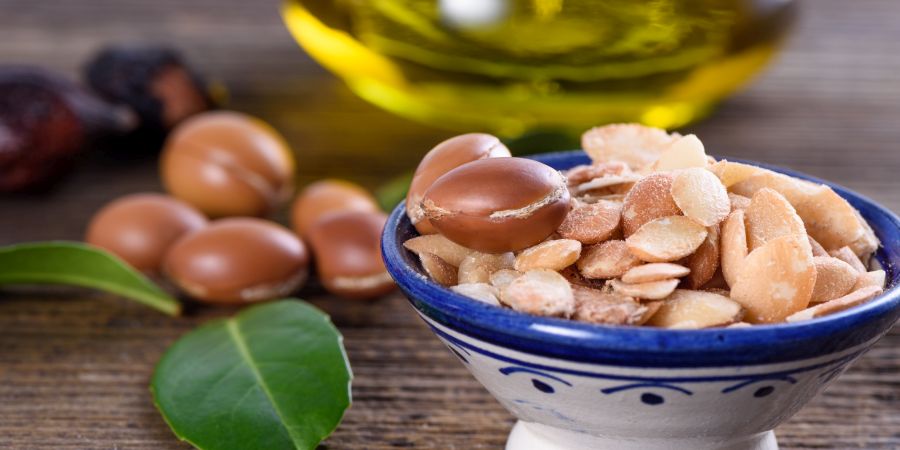Here’s why using argan oils on your skin and hair is one of the smartest beauty decisions you can make (if you want to improve strength and hydration).
Table of contents:
What Is Argan oil?
Benefits of Argan oil.
What makes Argan oils effective?
Best form of Argan oil.
How to use Argan oils.
Today we’d like to shed some light on an ingredient you’ve no doubt heard about by now. Its official name is argan oil, but it’s often referred to as “liquid gold” or “miracle oil.”
Overkill? Maybe to some, but we tend to agree.
Read on to discover how argan oil lives up to these remarkable nicknames and how you can harness its conditioning power for your own skin and hair.
What Is Argan Oil?
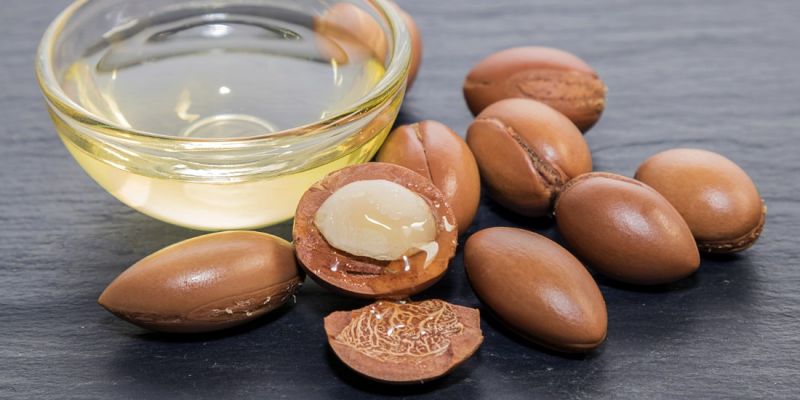
Argan oil comes from the kernels of the argan tree, which grows native in Morocco. In this northern African nation, it is used as a delicious topping for pasta or as a dip for breads.
In the western world, however, argan oils are most often used in the cosmetic industry.
The Argania spinosa tree grows only in a limited area of southwest Morocco, making this oil relatively hard to find. In fact, it happens to be one of the rarest oils on earth – despite its growing popularity in topical skincare products.
Boasting a rich history, argan oils have existed since ancient times with records of the Phoenicians using it as early as 1550 BC.
Benefits of Argan Oil for Skin & Hair
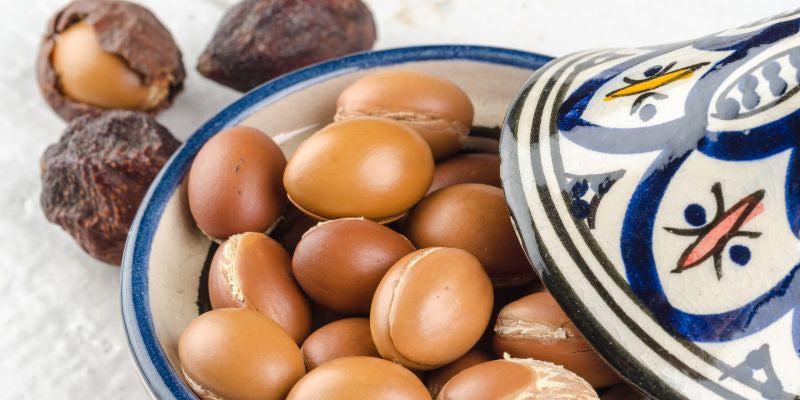
By now, you’ve probably heard of the argan craze sweeping the beauty industry. That’s because argan oil is able to moisturize without excessive amounts of grease – perfect for skin and hair.
In fact, when used on skin, it actually works to control oil production.
It’s also known to balance sensitive skin, making it less susceptible to irritants. Welcome news to those of us with delicate skin!
It has even been used to control bothersome conditions such as eczema, psoriasis and rosacea. Possessing anti-aging qualities, it also improves skin elasticity, especially when applied at night.
Not just beneficial for skin, argan oils hydrate, strengthen and smoothes hair as well. It’s highly effective as a split-end treatment – just a few drops is typically all you need. It also protects the hair from heat damage as well as environmental damage.
Working to prevent dandruff and boost growth, argan oil for hair also improves shine and thickens each individual strand.
Besides these incredible benefits, argan oils can provide serious results throughout the body. In fact, it’s been found to:
- Lower bad cholesterol
- Aid in digestion
- Help heal burns
- Decrease joint pain
- Strengthen nails
- Moisturize lips
What Makes Argan Oils So Effective?
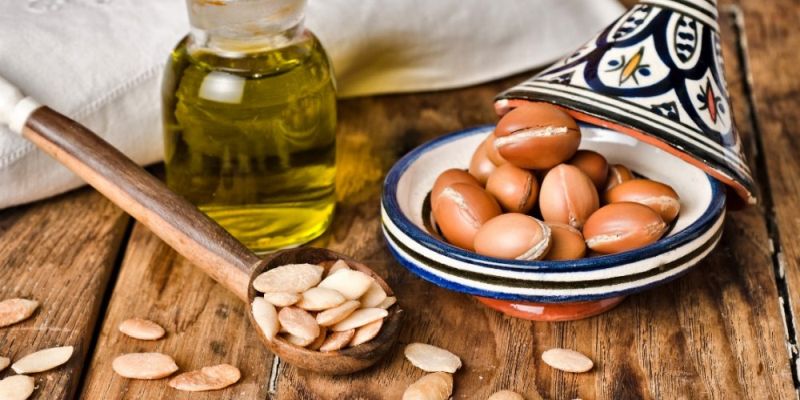
Often referred to as “liquid gold” in the cosmetic industry, argan is loaded with healthful nutrients that the body needs.
- For instance, it’s home to some of nature’s most potent antioxidants, boosting the body’s ability to fight off free radicals.
- It is made up primarily of oleic and linoleic fatty acids mixed with rejuvenating vitamin E for cell nourishment.
- It’s also high in CoQ10 and melatonin. These two molecules play a key roll in cellular energy (mitochondria), very important for human health.
Though an oil, it doesn’t clog pores like many other oils do. Instead, it locks in moisture while protecting the body from environmental damage.
All of these constituents work together to form one remarkable feature – it quite literally improves the skin’s ability to retain and maintain its water-holding capacity.
Best Form of Argan Oil

Because argan is in such high demand, workers are harvesting the fruits before they’re ready, leading to a vast deforestation of argan trees. Due to this aggressive harvesting, UNESCO has listed the tree as protected.
For the environment’s sake, you should only choose oils that have been harvested using safe techniques by fair-trade cooperatives.
In addition, when choosing argan oils, always consider how it will be used. When taking it internally, look for pure pressed sources. Beware of cheap products that use highly diluted oil.
Being sourced in nature, it’s important to choose 100% organic argan grown and harvested without the use of harmful chemicals.
How to Use Argan Oils + A Quick DIY Recipe
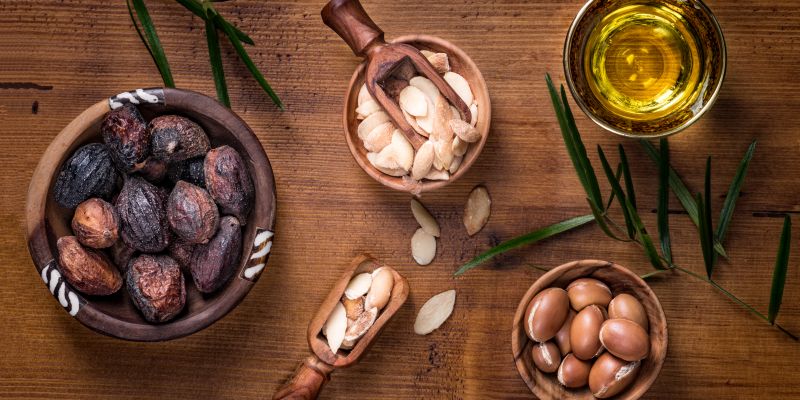
While pure argan oil has a shelf life of up to 6 months, it can go rancid. It needs to be stores tightly sealed and away from light.
- When using internally, up to 2 tablespoons can be taken per day with physician’s approval.
- For hair, argan oil shampoo and conditioner should be applied in liberal amounts to coat each strand of hair fully.
- With skin and nails, you don’t need to use as much – just a light, even application is all you need to absorb it quickly and fully.
Interested in trying it out yourself? Anyone can make a bare-minimum argan oil conditioner by using this simple recipe:
- 2 Tbs softened coconut oil
- 1 Tbs shea butter
- 1 tsp argan oil
- A few drops of your favorite essential oil (try rosemary or clary sage)
Just mix all the ingredients together, and use as you would a normal conditioner. It is even more effective when paired with other hydrating ingredients, but this quick recipe is perfect for those moments when you run out of conditioner and can’t get to the store.
If you want to supercharge its anti-aging benefits than take a look at Renew. This is our anti-aging cream which contains many other ingredients that go along perfectly with argan oil.
You can also find it in our USDA Organic Eye Balm for crow’s feet, under eye bags, dark circles, and puffiness.
Say goodbye to wrinkles and dull skin!
Summary
Though argan oil is rare and costly, it provides a host of benefits that are unparalleled for skin and hair.
Being naturally non-greasy, it allows skin to breathe without aggravating certain skin conditions – a characteristic that sets it apart from more common oils.
If you are looking for a natural skin and hair moisturizer, this is one of your top options. It mixes well with other skincare ingredients for an extra-powerful combination.
Give it a try and see for yourself just how magical it is.

